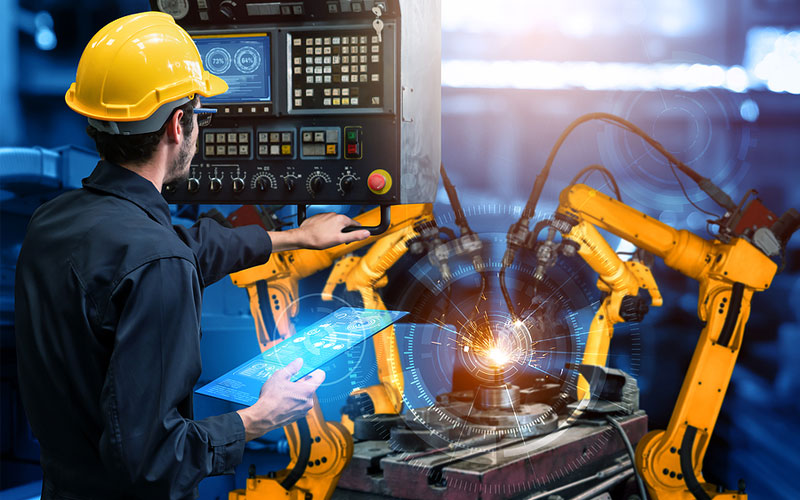In times, the integration of Artificial Intelligence (AI) tools has led to remarkable progress in industrial automation. AI is revolutionizing manufacturing processes by enhancing efficiency, productivity, and precision across industries. From employing machine learning algorithms to utilizing robotics and predictive analytics, AI tools are reshaping the landscape of factories and plants. As you continue reading, we will take a look into the application of AI tools in automation and explore the multitude of benefits they offer to the processes of manufacturing.
Predictive Maintenance Powered by Machine Learning Algorithms
One application that is the best of AI in automation is predictive maintenance. Through the analysis of data gathered from sensors and machines, machine learning algorithms can identify anomalies and forecast equipment failures before they transpire. By monitoring machinery conditions, AI tools can detect patterns and deviations that suggest issues. This proactive maintenance approach aids in averting downtime, optimizing maintenance schedules, and reducing maintenance expenses.
Robotics and Automated Assembly
For quite some time now, robots have been utilized in manufacturing processes due to their capacity for executing tasks with precision and efficiency. However, with advancements in AI technology, robotics has reached new levels.
AI-powered robots have the ability to learn from operators and adapt to tasks without requiring complex programming. They can also collaborate with humans, enhancing productivity and safety in manufacturing environments. These robots equipped with the best AI tools are revolutionizing manufacturing processes ranging from picking and packing to assembly and quality control.
Automated Quality Control
One important aspect of manufacturing is ensuring the quality of products. AI tools and computer vision systems play a role in automating the quality control process. By analyzing images or videos captured by cameras, computer vision algorithms can detect defects, anomalies, and deviations from specifications. This real-time inspection capability reduces reliance on inspection methods and minimizes human errors. By implementing AI-enabled quality control systems, manufacturers can enhance product consistency while reducing the number of defective items that reach customers.
Managing the Supply Chain
Managing the supply chain is a task that involves variables and uncertainties. However, AI tools such as analytics and demand forecasting algorithms can greatly optimize supply chain management processes. Through analyzing data, market trends, and other relevant factors AI, AI-powered systems can accurately predict demand patterns, optimize inventory levels efficiently, and streamline logistics operations.
Not only does this improve the efficiency of the supply chain, but it also helps to lower costs and increase customer satisfaction.
Process Optimization with AI
AI tools can also be utilized to optimize manufacturing processes by identifying bottlenecks, tuning parameters, and discovering areas for improvement. By analyzing real-time data from sensors and production lines, AI algorithms can detect patterns and correlations that human operators might miss. This empowers manufacturers to enhance machine settings, boost energy efficiency, and minimize waste. Ultimately, process optimization with AI leads to productivity, cost savings, and enhanced product quality.
Improved Worker Safety
Ensuring safety is crucial in automation. AI tools like analytics and real-time monitoring systems can aid in accident prevention and risk reduction for workers. For instance, through analysis of data from sensors and wearable devices, AI algorithms can recognize safety hazards promptly and issue timely alerts. This enables supervisors to take action and implement measures. By integrating AI tools into the workplace, manufacturers can establish a working environment for their employees.
Collaboration Between AI and Human Workforce
Contrary to belief, AI is not intended to replace workers but rather to complement their capabilities by enhancing them.
AI technology has the capability to take on monotonous tasks, freeing up workers to concentrate on more intricate and innovative responsibilities that necessitate human judgment and creativity. This collaboration between AI and humans results in productivity, enhanced job satisfaction, and better performance.
Conclusion
AI tools are completely transforming automation and revolutionizing manufacturing processes. From maintenance to quality control and supply chain management, AI algorithms and robotics are significantly improving efficiency, productivity, and safety within factories and plants. Manufacturers who embrace these AI tools can enjoy the advantages of performance-reduced costs and increased competitiveness in today’s changing global economy. It is evident that the future of manufacturing is driven by AI technology; those who adapt to this revolution will thrive in the industrial landscape.













